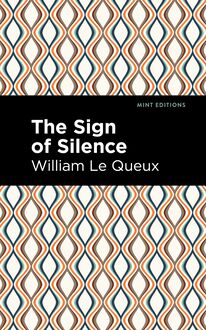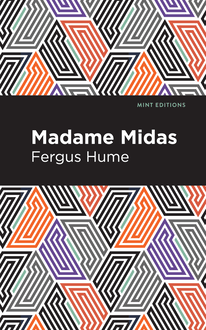-
 Univers
Univers
-
 Ebooks
Ebooks
-
 Livres audio
Livres audio
-
 Presse
Presse
-
 Podcasts
Podcasts
-
 BD
BD
-
 Documents
Documents
-
- Cours
- Révisions
- Ressources pédagogiques
- Sciences de l’éducation
- Manuels scolaires
- Langues
- Travaux de classe
- Annales de BEP
- Etudes supérieures
- Maternelle et primaire
- Fiches de lecture
- Orientation scolaire
- Méthodologie
- Corrigés de devoir
- Annales d’examens et concours
- Annales du bac
- Annales du brevet
- Rapports de stage
La lecture à portée de main
Vous pourrez modifier la taille du texte de cet ouvrage
Découvre YouScribe en t'inscrivant gratuitement
Je m'inscrisDécouvre YouScribe en t'inscrivant gratuitement
Je m'inscrisEn savoir plus
Vous pourrez modifier la taille du texte de cet ouvrage
En savoir plus

Description
Originally published in 1903, The Yellow Crayon further explores the adventures of Mr. Sabin whose wife Lucille has been targeted by a mysterious secret society. Her sudden disappearance drives him to uncover the truth about her professional connections.< Mr. Sabin has returned for a case involving an unexpected victim—his wife. When she goes missing, he’s immediately pulled into a mystery involving the order of the Yellow Crayon. It’s a group of powerful but hidden figures working to combat anarchy and socialism. Despite their mission, the current leader is only invested in personal gain. He is a manipulative presence that uses his influence to commit unspeakable acts. The Yellow Crayon is another one of E. Phillips Oppenheim’s memorable mysteries. It features a beloved protagonist as he tries to uncover a shocking truth. The story is full of revelations rooted in history, politics and greed. With an eye-catching new cover, and professionally typeset manuscript, this edition of The Yellow Crayon is both modern and readable.
Sujets
Informations
| Publié par | Mint Editions |
| Date de parution | 14 mai 2021 |
| Nombre de lectures | 0 |
| EAN13 | 9781513286273 |
| Langue | English |
| Poids de l'ouvrage | 1 Mo |
Informations légales : prix de location à la page 0,0500€. Cette information est donnée uniquement à titre indicatif conformément à la législation en vigueur.
Extrait
The Yellow Crayon
E. Phillips Oppenheim
The Yellow Crayon was first published in 1903.
This edition published by Mint Editions 2021.
ISBN 9781513281254 | E-ISBN 9781513286273
Published by Mint Editions®
minteditionbooks.com
Publishing Director: Jennifer Newens
Design & Production: Rachel Lopez Metzger
Project Manager: Micaela Clark
Typesetting: Westchester Publishing Services
C ONTENTS I II III IV V VI VII VIII IX X XI XII XIII XIV XV XVI XVII XVIII XIX XX XXI XXII XXIII XXIV XXV XXVI XXVII XXVIII XXIX XXX XXXI XXXII XXXIII XXXIV XXXV XXXVI XXXVII XXXVIII XXXIX XL XLI XLII XLIII
I
It was late summer-time, and the perfume of flowers stole into the darkened room through the half-opened window. The sunlight forced its way through a chink in the blind, and stretched across the floor in strange zigzag fashion. From without came the pleasant murmur of bees and many lazier insects floating over the gorgeous flower beds, resting for a while on the clematis which had made the piazza a blaze of purple splendour. And inside, in a high-backed chair, there sat a man, his arms folded, his eyes fixed steadily upon vacancy. As he sat then, so had he sat for a whole day and a whole night. The faint sweet chorus of glad living things, which alone broke the deep silence of the house, seemed neither to disturb nor interest him. He sat there like a man turned to stone, his forehead riven by one deep line, his straight firm mouth set close and hard. His servant, the only living being who had approached him, had set food by his side, which now and then he had mechanically taken. Changeless as a sphinx, he had sat there in darkness and in light, whilst sunlight had changed to moonlight, and the songs of the birds had given place to the low murmuring of frogs from a lake below the lawns.
At last it seemed that his unnatural fit had passed away. He stretched out his hand and struck a silver gong which had been left within his reach. Almost immediately a man, pale-faced, with full dark eyes and olive complexion, dressed in the sombre garb of an indoor servant, stood at his elbow.
“Duson.”
“Your Grace!”
“Bring wine—Burgundy.”
It was before him, served with almost incredible despatch—a small cobwebbed bottle and a glass of quaint shape, on which were beautifully emblazoned a coronet and fleur-de-lis. He drank slowly and deliberately. When he set the glass down it was empty.
“Duson!”
“Your Grace!”
“You will pack my things and your own. We shall leave for New York this evening. Telegraph to the Holland House for rooms.”
“For how many days, your Grace?”
“We shall not return here. Pay off all the servants save two of the most trustworthy, who will remain as caretakers.”
The man’s face was as immovable as his master’s.
“And Madame?”
“Madame will not be returning. She will have no further use for her maid. See, however, that her clothes and all her personal belongings remain absolutely undisturbed.”
“Has your Grace any further orders?”
“Take pencil and paper. Send this cablegram. Are you ready?”
The man’s head moved in respectful assent.
To Felix,
No 27, Rue de St. Pierre,
Avenue de L’Opera, Paris.
Meet me at Sherry’s Restaurant, New York, one month to-day, eleven P.M.
V. S.
“It shall be sent immediately, your Grace. The train for New York leaves at seven-ten. A carriage will be here in one hour and five minutes.”
The man moved towards the door. His master looked up.
“Duson!”
“Your Grace!”
“The Duc de Souspennier remains here—or at the bottom of the lake—what matters! It is Mr. Sabin who travels to New York, and for whom you engage rooms at the Holland House. Mr. Sabin is a cosmopolitan of English proclivities.”
“Very good, sir!”
“Lock this door. Bring my coat and hat five minutes before the carriage starts. Let the servants be well paid. Let none of them attempt to see me.”
The man bowed and disappeared. Left to himself, Mr. Sabin rose from his chair, and pushing open the windows, stood upon the verandah. He leaned heavily upon his stick with both hands, holding it before him. Slowly his eyes traveled over the landscape.
It was a very beautiful home which he was leaving. Before him stretched the gardens—Italian in design, brilliant with flowers, with here and there a dark cedar-tree drooping low upon the lawn. A yew hedge bordered the rose-garden, a fountain was playing in the middle of a lake. A wooden fence encircled the grounds, and beyond was a smooth rolling park, with little belts of pine plantations and a few larger trees here and there. In the far distance the red flag was waving on one of the putting greens. Archie Green was strolling up the hillside,—his pipe in his mouth, and his driver under his arm. Mr. Sabin watched, and the lines in his face grew deeper and deeper.
“I am an old man,” he said softly, “but I will live to see them suffer who have done this evil thing.”
He turned slowly back into the room, and limping rather more than was usual with him, he pushed aside a portiere and passed into a charmingly furnished country drawing-room. Only the flowers hung dead in their vases; everything else was fresh and sweet and dainty. Slowly he threaded his way amongst the elegant Louis Quinze furniture, examining as though for the first time the beautiful old tapestry, the Sevres china, the Chippendale table, which was priceless, the exquisite portraits painted by Greuze, and the mysterious green twilights and grey dawns of Corot. Everywhere treasures of art, yet everywhere the restraining hand of the artist. The faint smell of dead rose leaves hung about the room. Already one seemed conscious of a certain emptiness as though the genius of the place had gone. Mr. Sabin leaned heavily upon his stick, and his head drooped lower and lower. A soft, respectful voice came to him from the other room.
“In five minutes, sir, the carriage will be at the door. I have your coat and hat here.”
Mr. Sabin looked up.
“I am quite ready, Duson!” he said.
T HE SERVANTS IN THE HALL stood respectfully aside to let him pass. On the way to the depot he saw nothing of those who saluted him. In the car he sat with folded arms in the most retired seat, looking steadfastly out of the window at the dying day. There were mountains away westwards, touched with golden light; sometimes for long minutes together the train was rushing through forests whose darkness was like that of a tunnel. Mr. Sabin seemed indifferent to these changes. The coming of night did not disturb him. His brain was at work, and the things which he saw were hidden from other men.
Duson, with a murmur of apology, broke in upon his meditations.
“You will pardon me, sir, but the second dinner is now being served. The restaurant car will be detached at the next stop.”
“What of it?” Mr. Sabin asked calmly.
“I have taken the liberty of ordering dinner for you, sir. It is thirty hours since you ate anything save biscuits.”
Mr. Sabin rose to his feet.
“You are quite right, Duson,” he said. “I will dine.”
In half-an-hour he was back again. Duson placed before him silently a box of cigarettes and matches. Mr. Sabin smoked.
Soon the lights of the great city flared in the sky, the train stopped more frequently, the express men and newspaper boys came into evidence. Mr. Sabin awoke from his long spell of thought. He bought a newspaper, and glanced through the list of steamers which had sailed during the week. When the train glided into the depot he was on his feet and ready to leave it.
“You will reserve our rooms, Duson, for one month,” he said on the way to the hotel. “We shall probably leave for Europe a month to-morrow.”
“Very good, sir.”
“You were Mrs. Peterson’s servant, Duson, before you were mine!”
“Yes, sir.”
“You have been with her, I believe, for many years. You are doubtless much attached to her!”
“Indeed I am, sir!”
“You may have surmised, Duson, that she has left me. I desire to ensure your absolute fidelity, so I take you into my confidence to this extent. Your mistress is in the hands of those who have some power over her. Her absence is involuntary so far as she is concerned. It has been a great blow to me. I am prepared to run all risks to discover her whereabouts. It is late in my life for adventures, but it is very certain that adventures and dangers are before us. In accompanying me you will associate yourself with many risks. Therefore—”
Duson held up his hand.
“I beg, sir,” he exclaimed, “that you will not suggest for a moment my leaving your service on that account. I beg most humbly, sir, that you will not do me that injustice.”
Mr. Sabin paused. His eyes, like lightning, read the other’s face.
“It is settled then, Duson,” he said. “Kindly pay this cabman, and follow me as quickly as possible.”
Mr. Sabin passed across the marble hall, leaning heavily upon his stick. Yet for all his slow movements there was a new alertness in his eyes and bearing. He was once more taking keen note of everybody and everything about him. Only a few days ago she had been here.
He claimed his rooms at the office, and handed the keys to Duson, who by this time had rejoined him. At the moment of turning away he addressed an inquiry to the clerk behind the counter.
“Can you tell me if the Duchess of Souspennier is staying here?” he inquired.
The young man glanced up.
“Been here, I guess. Left on Tuesday.”
Mr. Sabin turned away. He did not speak again until Duson and he were alone in the sitting-room. Then he drew out a five dollar bill.
“Duson,” he said, “take this to the head luggage porter. Tell him to bring his departure book up here at once, and there is another waiting for him. You understand?”
“Certainly, sir!”
Mr. Sabin turned to enter his bed-chamber. His attention was attracted, however, by a letter lying flat upon the table. He took it up. It was addressed to Mr. Sabin.
“This is very clever,” he mused, hesitating for a moment before opening it. “I wired for rooms only a few hours ago—and I find a let
-
 Univers
Univers
-
 Ebooks
Ebooks
-
 Livres audio
Livres audio
-
 Presse
Presse
-
 Podcasts
Podcasts
-
 BD
BD
-
 Documents
Documents
-
Jeunesse
-
Littérature
-
Ressources professionnelles
-
Santé et bien-être
-
Savoirs
-
Education
-
Loisirs et hobbies
-
Art, musique et cinéma
-
Actualité et débat de société
-
Jeunesse
-
Littérature
-
Ressources professionnelles
-
Santé et bien-être
-
Savoirs
-
Education
-
Loisirs et hobbies
-
Art, musique et cinéma
-
Actualité et débat de société
-
Actualités
-
Lifestyle
-
Presse jeunesse
-
Presse professionnelle
-
Pratique
-
Presse sportive
-
Presse internationale
-
Culture & Médias
-
Action et Aventures
-
Science-fiction et Fantasy
-
Société
-
Jeunesse
-
Littérature
-
Ressources professionnelles
-
Santé et bien-être
-
Savoirs
-
Education
-
Loisirs et hobbies
-
Art, musique et cinéma
-
Actualité et débat de société
- Cours
- Révisions
- Ressources pédagogiques
- Sciences de l’éducation
- Manuels scolaires
- Langues
- Travaux de classe
- Annales de BEP
- Etudes supérieures
- Maternelle et primaire
- Fiches de lecture
- Orientation scolaire
- Méthodologie
- Corrigés de devoir
- Annales d’examens et concours
- Annales du bac
- Annales du brevet
- Rapports de stage




















